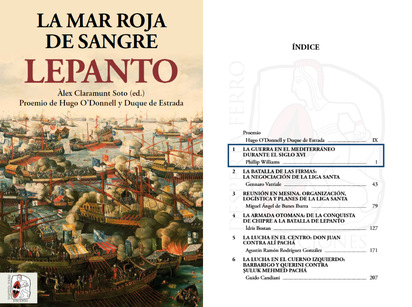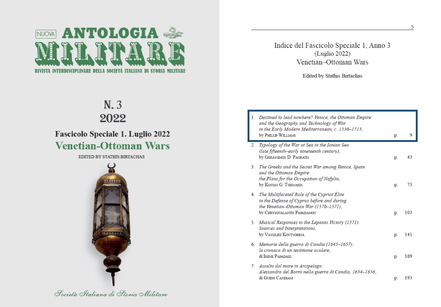Dr Phillip Williams, an EAP lecturer of SBC, has published two articles on the battle of Lepanto and the conflicts between Venice and the Ottoman Empire, as part of two volumes of essays respectively, Lepanto. La mar roja de sangre and NAM Fascicolo Speciale 1 2022 Venetian-Ottoman Wars. Notably, Dr Phillip’s two papers were published first in each volume, which is traditionally reserved for the most important essay.

Dr Phillip Williams
His paper entitled “La guerra en el Mediterráneo durante el siglo XVI” (Mediterranean Warfare in the Sixteenth-Century) appeared in the volume of Lepanto. La mar roja de sangre published in Spain to commemorate the 450th year Anniversary of the great naval engagement. Lepanto (1571) is undoubtedly one of the most famous battles in history, although many interpretations about it are highly questionable.
In this paper, he argued that the traditional views of this battle are not accurate. “While Lepanto was an important event, it did not have dramatic political or military effects. Instead, it was a battle that both sides were reluctant to fight and from which both sides obtained relatively little. On the other hand, the forces deployed by both sides in 1571 were very sophisticated and were considerably more advanced than the navies of France or England at the time.”

Lepanto. La mar roja de sangre
His paper entitled “Destined to lead nowhere? Venice, the Ottoman Empire and the Geography and Technology of War in the Early Modern Mediterranean, c. 1530-1715” was collected in NAM Fascicolo Speciale 1 2022 Venetian-Ottoman Wars. In 1687 the famous Parthenon of Athens was destroyed during a bombardment by a Venetian army, which provides a good symbol for the wars of the period (1499-1718).
The paper argues that these campaigns were profoundly destructive of the political, financial and economic structures of society to both Venice and the Ottomans. European forces were not as advanced or sophisticated as has often been claimed. New technology, some of it originating in China (gunpowder), was used, but to limited effect. The conflicts in the Mediterranean were very important in terms of their financial cost and the size of forces mobilised – they were at least as important as the fighting in the Atlantic. But all powers ended up weaker, with more debts and very serious doubts about their financial systems.
These two collections of essays bring together experts from different countries, all of whom provide new perspectives based upon the latest research to bridge the gap in knowledge and overcome simple ideas about the power and glory of wars.
Dr Phillip said, “I love teaching at the Sino-British College and get a lot of good ideas from my students and colleagues. And I am currently preparing another paper on a related topic, the Battle of Preveza of 1538.” SBC is committed to supporting all our lecturers and students to make contributions in any field.

NAM Fascicolo Speciale 1 2022 Venetian-Ottoman Wars





